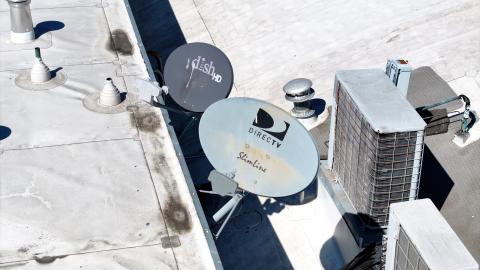On paper, combining DirecTV and Dish makes enormous business sense. The DirecTV and Dish customers for Direct Broadcast Satellite (DBS) service peaked in 2015, about the time that AT&T purchased DirecTV for more than $48 billion. The economic prospects for DBS services have steadily, and at times rapidly, declined since. A combined corporate entity could more efficiently manage the predictable decline of DBS service than can DirecTV and Dish separately.
The deal structure is simple. DirecTV is purchasing DISH from EchoStar for $1 plus an assumption of nearly $9.8 billion of debt. TPG, already a part owner of DirecTV, is purchasing AT&T’s remaining 70% interest in DirecTV. at a price well below what AT&T paid for it.
Less simple is getting the deal approved by creditors and Washington regulators. Creditors would lose more than $1.5 billion in the principal amount of Dish debt. Creditors could object and block the deal, or creditors could agree to the terms under the assumption that, absent the deal, EchoStar may pay even less.
If creditors only had to look at the financial structure of the current deal, the decision might be straightforward. But deals in the telecommunications sector can take a long time for regulatory review in Washington. DirecTV and Dish have issued guidance of closing in the fourth quarter of 2025 pending regulatory approval. The simple translation is that there is no plausible scenario to close sooner, although closing may be delayed by regulators.
Delays for regulatory approval of a merger is not the same as waiting in a long line to purchase groceries. In a grocery store, the purchaser knows exactly what she is purchasing and the price of the purchase no matter how long the line.
In Washington, regulatory delay of an acquisition often means changes in the terms of the deal, both what is being purchased and at what price—as well as the closing date. The changes never benefit the purchaser, its shareholders, or its creditors. Most major changes are disclosed. But some changes, oral agreements negotiated behind closed doors, are not. The exact process for the changes is never disclosed.
What can go wrong? Look at history.
Markets for video entertainment, including DBS, have been competitive for more than 30 years. A little more than 20 years ago, Dish sought to acquire DirecTV. From an economic perspective, it should have been approved. After several months of paper filings, the Federal Communications Commission, in anticipation that the Department was ready to block the deal on competition grounds, stepped in to block the transaction itself. At the time, the Department of Justice looked at DBS services as a separate market.
Rational observers note that market conditions have changed since the early 2000s. DBS was in a competitive market then and is a competitive market—and failing in that market--today. But old regulatory practices linger. For example, despite courts finding that its limit on the national reach of cable operators is unlawful, the FCC continues implicitly to enforce a 30% national cap. That unlawful rule does not count DBS and broadband service providers, little comfort to a cable operator whose customers migrate to broadband services.
DOJ is sometimes trapped in the past as well. A few years ago, it sought to block AT&T’s acquisition of Time Warner on antitrust grounds. After painstaking litigation, courts allowed AT&T to purchase Time Warner over DOJ’s objections. It turned out to be a bad deal, not for DOJ’s antitrust reasons, but for financial realities.
Or look at the T-Mobile-Sprint deal. It was eventually approved by regulators, but only after delays and unanticipated costly divestitures, none of which improved the deal from T-Mobile’s perspective.
And yet the DirecTV-Dish deal makes much business sense. The combined entity could negotiate content contracts more effectively and could, in a few years, distribute programming via satellite on one rather than two networks. Such network consolidation could help eventually unleash the value of underutilized DBS spectrum. And merging the companies could allow more efficient customer service and back-office operations.
Is DirecTV-Dish a match made in heaven? It is a match made by individuals with human strengths and human weaknesses. It must be approved by creditors and regulators, all with the same human strengths and weaknesses. It is a combination of two weak companies that would be stronger and more efficient together than apart. The approval process likely will have little direct relationship to the strengths of the underlying business value of the transaction.
Enjoyed this article? Subscribe to Hudson’s newsletters to stay up to date with our latest content.















